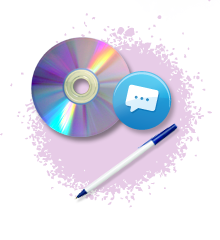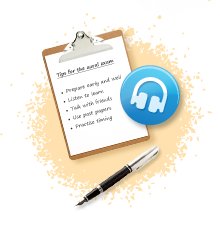Tips for Oral and Aural Exams
These exams can be scary but with these strategic tips you can take them in your stride.
Preparing for the oral exam:

- Prepare early and well: lots of practise is essential for good language skills. Get started early and use the language as much as you can.
- Put aside language time: spend some time each day speaking in the language you’re learning.
- Learn vocabulary: put together key words you’ll need for certain topics on flash cards.
- Check pronunciation: check it with the teacher, by recording yourself or by talking to a native speaker.
- Listen and learn: listen to the language as much as you can: on CD, Youtube, with a friend etc.
- Practise set pieces: anything you can prepare beforehand, do so and practise it lots.
During the oral exam:
- Be polite: stay polite and mannerly towards the examiner.
- Don’t worry about nerves: we all get nervous. You never lose marks for nervousness. It would be strange if you weren’t nervous.
- Don’t be afraid: the examiner wants you to do well and wants to give you marks so no need to fear them.
- Answer fully: answers the questions as fully as you can. Avoid the yes/no answer.
- Guide questions: mention things you want to talk about and the conversation will be guided that way.
- Ask for clarification: if you don’t understand a question don’t be afraid to ask for it to be repeated or reworded.
- Verb tense: pay attention to the verb tense and use the one dictated by the question.
- Slow down: take your time. There’s no rush.
- Speak clearly: speak out clearly. Don’t mumble.
Preparing for the aural exam:

- Prepare early and well: lots of practise is essential for good language skills. Get started early and use the language as much as you can.
- Listen to learn: listen to the language as much as you can: to the teacher, DVDs, Youtube, friends etc.
- Talk with friends: get together with some of your classmates and listen to tapes of the language; speak it together.
- Use past papers: practise with past exams.
- Practise timing: make sure you can answer in the time allotted.
During the aural exam:
- Read the paper: read every bit of the paper. It will help prepare you for what you are about to listen to.
- Listen first: on the first playing of the tape just listen to get an overall impression of what’s going on.
- Write second: on the second playing answer the questions. Fill in an answer to all questions, even if it’s just a guess.
- Check third: on the third playing check your answers and add any extra information you now hear.
For more study tips, read Shortcuts to Success: Study and Exam Skills for Leaving Certificate by Irene Togher.